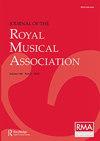Music and Austrofascism: Radio, Pan-Germanism and the Reinvention of the Wiener Symphoniker
IF 0.5
2区 艺术学
0 MUSIC
引用次数: 0
Abstract
Abstract ‘Austrofascist’ has again become an accepted term to describe the Austrian regime from 1933 to 1938. This article contributes to this re-emergence using the example of the Wiener Symphoniker, and by seeking long-term ‘fascistization’ processes surrounding the orchestra rather than blunt comparisons against developments in neighbouring regimes. The account hinges on the Austrian radio service (RAVAG), through which, during the economic crises of the 1920s, the state exerted alignment pressure on many cultural institutions. As Chancellor Dollfuss declared the ‘depoliticization’ of Austria (the banning of political parties) in 1933, RAVAG used its leverage to break the orchestra’s union alliances and dictate personnel selection according to politics. On this foundation, new radio series like Stunde österreichischer Komponisten der Gegenwart (‘Austrian Composers of the Present’) extolled ‘pan-Germanism’: a nationalist ideology that proclaimed the European supremacy of German Austrians and attempted to forge an Austrofascist community – even as it simultaneously created exploitable overlap with National Socialism.音乐与奥地利法西斯主义:广播、泛日耳曼主义与维纳交响乐团的复兴
摘要“奥地利法西斯主义者”再次成为描述1933年至1938年奥地利政权的公认术语。这篇文章以维纳交响乐团为例,通过寻求围绕交响乐团的长期“法西斯主义”过程,而不是与邻近政权的发展进行直率的比较,为这种重新出现做出了贡献。该报道依赖于奥地利广播服务(RAVAG),在20世纪20年代的经济危机期间,国家通过该服务对许多文化机构施加了结盟压力。1933年,当总理多尔福斯宣布奥地利“非政治化”(禁止政党)时,RAVAG利用其影响力打破了乐团的工会联盟,并根据政治决定人员选择。在此基础上,Stundeösterreichischer Komponisten der Gegenwart(“当代澳大利亚作曲家”)等新的广播系列赞扬了“泛日耳曼主义”:一种民族主义意识形态,它宣称德国-奥地利人在欧洲的至高无上地位,并试图建立一个奥地利主义社区,尽管它同时与国家社会主义产生了可利用的重叠。
本文章由计算机程序翻译,如有差异,请以英文原文为准。
求助全文
约1分钟内获得全文
求助全文
来源期刊
CiteScore
0.50
自引率
0.00%
发文量
16
期刊介绍:
The Journal of the Royal Musical Association was established in 1986 (replacing the Association"s Proceedings) and is now one of the major international refereed journals in its field. Its editorial policy is to publish outstanding articles in fields ranging from historical and critical musicology to theory and analysis, ethnomusicology, and popular music studies. The journal works to disseminate knowledge across the discipline and communicate specialist perspectives to a broad readership, while maintaining the highest scholarly standards.

 求助内容:
求助内容: 应助结果提醒方式:
应助结果提醒方式:


